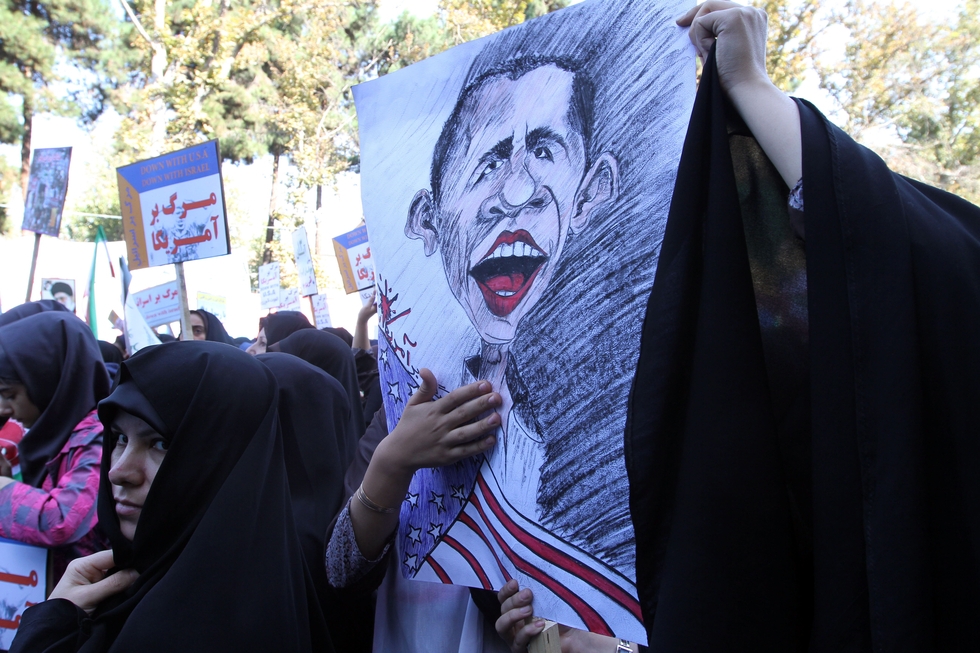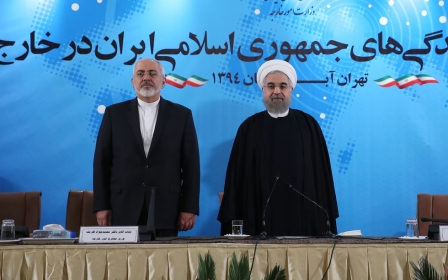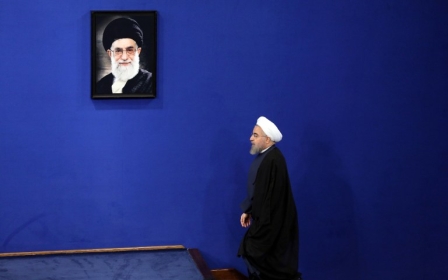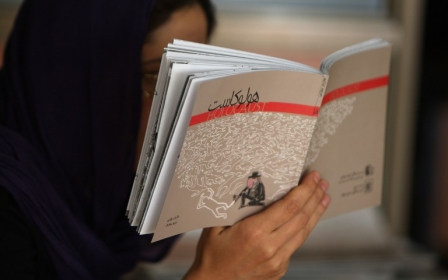Khamenei's doctrine of 'West minus the US' risks failing again

During Iraq's military offensive against Iran (1980-1988), former Iranian president Ali Akbar Hashemi Rafsanjani defended restoring relations with the United States. The peculiarity and significance of Rafsanjani's position is evident when one considers the Iranian political climate during that period.
The leader of the Iranian revolution, Ayatollah Ruhollah Khomeini, had an uncompromising, antagonistic stance toward the US when he was still alive.
Moreover, due to the developments in the aftermath of the seizure of the American embassy in Tehran, including the Americans' support for Iraqi President Saddam Hussein in his war against Iran, the hostilities between Iran and the US had reached its apogee.
It is no exaggeration to say that no one dared to talk about reconciliation with the US unless one was as close to Ayatollah Khomeini as Rafsanjani was. At the time, he was arguably the second most powerful man in Iran after Iran's leader.
In an interview in 2013, Rafsanjani said:
"I wrote a letter to Imam [Khomeini] in the last years of his life [he died in 1989]. I even didn't type it. As I preferred that no one read my letter, I gave it to Imam personally. I discussed about seven issues in the letter and I told him it was better to resolve those issues while he was alive, otherwise those issues might become a barrier against the country's development in the future. [I said] that if you don't help us remove them, it would be difficult to remove them after you [die]. … One of those issues was the relations with America. I wrote the way that we have adopted now: not to talk or have any relations with America is not sustainable."
Shortly after the death of Iran's revolutionary leader in July 1989, Ayatollah Ali Khamenei was elected as Iran's second supreme leader, against even his own expectations. After the election, Khamenei said:
"I did not expect, even for a second in my life, the outcome of the process which ended in my election as the new leader and the responsibility that was put on my shoulder as a humble weak servant of Allah … I always considered my level [of qualifications] too low for this highly significant and crucial post but also even much lower posts like the presidency and other posts, which I have held since the revolution."
It is likely that this mentality resulted in him concluding that he was not in a position to risk his "highly crucial post" by abandoning his mentor's heritage of the characterisation of the United States as the Great Satan. In other words, he perceived that the state of enmity with the US had to be woven into the fabric of the revolution, and that the nezam (political system) must stay revolutionary and thus that hostilities had to perpetuate.
Divergence between Rafsanjani and Khamenei
In August 1989, Rafsanjani was elected president. Although he played a decisive role in Khamenei's election, the two significantly diverged over Iran-US relations. Ayatollah Khamenei banned any talks with the US given his belief that the Americans' ultimate goal was "regime change". Khamenei adopted the doctrine of "West minus the United States," which determined the Rafsanjani administration's foreign policy.
Rafsanjani placed great importance and effort on normalising relations with the West, and even conducted indirect rapprochement efforts toward the US. But one reality could not be ignored: to have friendly relations with the West as a political bloc while having hostile relations with the leading state of that bloc was senseless.
As a result, relations with Europe remained unstable. Finally, five years after the Mykonos assassinations – three Iranian-Kurdish opposition leaders and their translator were assassinated by gunmen who attacked a Greek Mykonos restaurant in Berlin – a German court verdict in April 1997 identified the Iranian government as having "inspired, supported, and supervised" the terrorist act.
Relations with Germany quickly spiralled downwards, and both countries recalled their ambassadors. Other EU member states recalled their ambassadors, and in a retaliatory move Iran withdrew its ambassadors from those countries.
Two months later, the reformist Mohammad Khatami won the presidential election on a platform of liberalisation and reform, thus immediately raising serious consideration by European countries about returning to Iran. Iranians were informed about this decision through different channels.
After six months of deliberations between the Iranian Ministry of Foreign Affairs and the Europeans, their embassies opened again in Tehran.
While the policy of "West minus the United States" remained in effect, the reformists made overtures toward the US. Before and after the tragic events of September 11 2001, they conducted direct talks with Washington. The talks centred on the situation in Afghanistan rather than bilateral relations. After September 11, talks were directed toward unseating the common enemy, the Taliban. Iran effectively cooperated with American-led forces in bringing down the Taliban and afterward establishing Afghanistan's new government.
But a few weeks later, on 4 January, 2002, Iran was suddenly accused by the Israelis of complicity with smuggling a huge consignment of weapons to the Palestinian Authority. The news took the headlines by storm. After three weeks, President Bush included Iran in the "axis of evil". The Washington Post reported in early February that "the discovery of Iran's role in smuggling 50 tons of weapons to the Palestinians was a body blow to the State Department's initiative to engage Iran." Ironically, at that point Iran had very tense relations with Yasser Arafat, the Palestinian Authority leader. That made the claim completely implausible.
Then the August 2002 revelations about the existence of Iran's nuclear enrichment facilities began one of the most complex international conflicts in the post-Cold War era. Talks were held between Iranians and the European troika (Britain, France, and Germany), but the major obstacle in reaching an agreement was US insistence on the notion of "zero uranium enrichment inside Iran".
The situation was well-defined by then British Foreign Secretary Jack Straw. Speaking at a BBC panel in July 2013, he remarked, "We were getting somewhere, with respect, and then it's a complicated story. The Americans actually pulled the rug from under [President Mohammad] Khatami's feet and the Americans got what they didn't want."
John Sawers, then one of the British negotiators and current chief of the UK Secret Intelligence Service (MI6), told Hossein Mousavian, a member of the Iranian negotiating team, that Washington would not tolerate even one centrifuge spinning in Iran. The talks collapsed in 2005.
Eventually, Tehran succeeded in overcoming the crisis when it revised its zero-talks policy toward the US and launched direct negotiations with Washington in 2013.
The current state of Iran-US relations, as a result of Iran's decision not to hold bilateral talks on improving relations with the US, is shaky and unsustainable. Under Hassan Rouhani, the West minus the US doctrine is in motion again. Will it work this time? Unlikely.
The reality is that the likelihood of escalation of conflict between the two countries is, despite the culmination of the nuclear deal, still high. In this respect, the major element that is constantly in play is hostile Iran-Israel relations intertwined with ongoing allegations by both the US and Israel of Iran's support for terrorism, namely Hezbollah.
Other factors resulting in strained US-Iran relations are the US allegations accusing Iran of regional destabilisation, human rights abuses, and the expansion of its ballistic missile programme.
The doctrine of the West minus the US is doomed to fail. In the absence of direct talks aimed at reaching an enduring peace between the two states, one or a combination of the above factors can always spark new waves of tension between Iran and the US.
As pressure mounts, Europeans have to choose either Iran or the US. Faced with such a decision, the Europeans will ostensibly side with the US. As such, efforts to improve relations with Europe will fail, as has repeatedly happened in the past.
- Shahir Shahidsaless is a political analyst and freelance journalist writing primarily about Iranian domestic and foreign affairs. He is also the co-author of “Iran and the United States: An Insider’s View on the Failed Past and the Road to Peace”.
The views expressed in this article belong to the author and do not necessarily reflect the editorial policy of Middle East Eye.
Photo: An Iranian woman holds an anti-US slogan, which reads in Persian, "Death to America" bearing a cartoon of US President Barack Obama, outside the former US embassy in Tehran on 2 November, 2012, during a rally to mark the 33rd anniversary of seizure of the US embassy which saw hardline students hold 52 diplomats hostage for 444 days (AFP).
New MEE newsletter: Jerusalem Dispatch
Sign up to get the latest insights and analysis on Israel-Palestine, alongside Turkey Unpacked and other MEE newsletters
Middle East Eye delivers independent and unrivalled coverage and analysis of the Middle East, North Africa and beyond. To learn more about republishing this content and the associated fees, please fill out this form. More about MEE can be found here.





